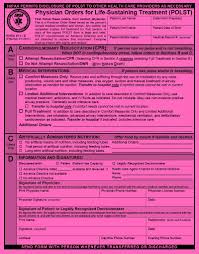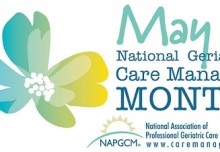I have either talked about or invited elder law attorneys to talk about advanced directives like Do Not Resuscitate (DNR) orders, living wills, powers of attorney and other documents that will help to assure that an older adult’s end of life wishes are honored. And that is where POLST comes in. It is a standardized (by state) document that walks through a patient’s wishes for end of life care that falls short of a DNR.
POLST is Physician Orders for Life-Sustaining Treatment. The majority of states have enacted such legislation following the lead of Oregon in 1991. It is standardized for the state and is typically a brightly colored single sheet so that it will stand out in a patient’s file. (Illinois’ form is two pages.) Not only doctors, but first responders and other clinicians will understand the instructions of the POLST. It is not for everyone, but if your older loved one is frail or suffers from a life-limiting illness, you should consider having a talk with your loved one’s physician along with your loved one. If your older loved one’s physician can honestly say they would not be surprised if that person died in the following year you would be well-advised to start the conversation in order to have the POLST on file.
What would that look like in a standardized form? In Illinois, the form asks for all the usual patient-identifying details, contact information for your older loved one’s preferred contact, physician contact information and the physician’s signature. The rest is pretty much a check list. Check yes or no if your loved one agrees to having CPR in the event their heart stops. If your loved is still breathing and there is a pulse, check yes or no for comfort measures only, for limited added interventions or for intubation for ventilation. To these the physician can add other measures. Finally, check yes or no for what kind of nutritional supplements are desired if your loved one cannot be fed by mouth. The rest is referred to as documentation that this discussion occurred between competent adults. To see the Illinois form, please go to this link (http://www.idph.state.il.us/public/books/dnrform.pdf)
As you can imagine, life or end of life decisions are not so cut and dried. There are some potential ethical issues to be addressed here. Clear and sensitive discussion needs to occur among you as the caregiver, your older loved one and the rest of the family. And then there is the real question of whether your older loved one can really understand all the medical speak. It may prove helpful to bring in a professional counselor to talk this through with the family unit so that all voices are heard and all questions or objections are raised. Most important, however, is that your older loved one feels that it is they who are in charge. This ultimately is not about the doctors or the family; it is about the care receiver.







